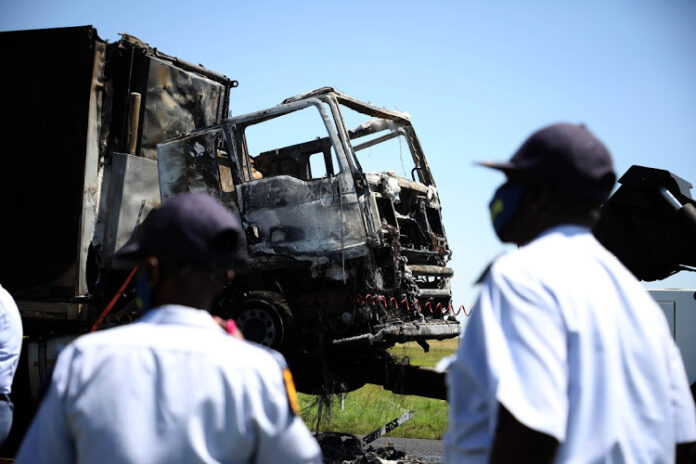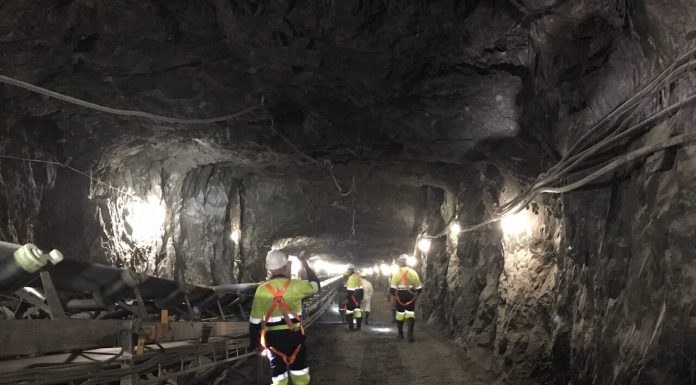A Zimbabwean truck driver who survived an ambush by six gunmen on the N12 highway near Daveyton, on the East Rand, recently was just 35km from his destination when the attack happened.
Joseph Chidodo, 45, was transporting a load of frozen chickens form Standerton to Linbro Park in Johannesburg.
Chidodo said a group of armed men ambushed him at about 4.42am on Wednesday when he slowed down to look at what appeared to be burning tyres in the middle of the road.
He tried to make a U-turn but the assailants opened fire at his truck and tried to open its doors. Chidodo’s truck was torched on the highway after he jumped out of the window and fled on foot.
Chidodo and another a 33-year-old SA truck driver, who asked not to be named, are the latest victims of recurring violent attacks targeting truck drivers across the country.
The attacks that peaked in July, according to police, have forced some trucking companies to beef up security and increase patrols to identified hotspots on major national roads.
Manny Ferreira from MBS security, a company assisting logistics companies with patrols, said the rise in truck attacks has forced them to patrol all hotspot routes that included the N17 and the R552.
He said the latest attacks happened after a quiet night that resulted in them knocking off earlier than usual, at about 3am.
“They [the attackers] came from the side of the road where they were hiding before they opened fire on me,” said Chidodo.
He said he outran his attackers after he jumped out of the truck window, and they turned back and torched the truck belonging to Hestony Transport.
Police forensic investigators combed the scene of the latest attacks, searching for clues among the remnants of the burnt trucks. An investigator on the scene told Sowetan that more than 50 attacks on trucks had been recorded in Gauteng in the past two months but police spokesperson Col Brenda Muridili refused to give figures.
Muridili said police were revisiting an earlier plan that relied on intelligence to stop the attacks before they happened.
“This [torching of trucks] is not new. It started last year, resurfaced in July and now we’re seeing it again so we dusted off those plans that we had and adjusted them accordingly and we are executing those plans,” Muridili said.
The Road Freight Association said it had recorded 30 such incidents of torching of trucks in the past 21 days while there were other minor incidents of trucks being stoned.
A 33-year-old South African driver employed by logistics company Digistics, who was heading to Middelburg, Mpumalanga, from Johannesburg, also escaped death when he was attacked by the same group of men on the N12.
He said he had stopped along the highway after he saw Chidodo’s truck on fire in the middle of the road.
“As I was driving under the bridge on the N12 towards the off-ramp, I noticed a burning truck on the right side of the road and I slowed down, thinking the driver of the other truck needed help but the worst happened,” said the driver.
“The heavily armed three men shot at the truck. لعبة الدومينو الامريكية I jumped out of the truck and ran towards the back and found my way into the nearby bushes. لعبة بوكر اون لاين ”
Sifiso Nyathi, secretary of All Truck Drivers Forum and Allied SA, a forum of SA truck drivers, said trucking companies have to be blamed for having pitted SA truck drivers against foreign nationals by giving preference to non-South Africans.
“The reason these truck companies prefer foreigners is because foreign nationals are prepared to take salaries of between R5,000 and R10,000 when they should be earning more than R30,000, which would include overtime and sleep out allowance as per agreements reached in the industry’s bargaining council,” Nyathi said.
He said there were many trucking companies with a 100% staff compliment of foreign nationals.
But Renier du Preez, CEO of Digistics, said his company has a staff compliment of 790 and “only four of my drivers are foreigners”.
“We have to address the problem now because our drivers are the fundamental foundation of our economy, they are the ones that move goods from point A to point B,” Du Preez said.
The Road Freight Association says attacks on trucks lead to higher insurance premiums for logistics companies and this eventually increases the cost of moving goods.
Gavin Kelly, the chief executive of the association, said over time some of the companies will start charging a premium for using certain routes as a result of the violence.
“Say a company charges R1,000 right now to move goods on a particular route, now they can either completely stop using that route altogether or start charging, let’s say R5,000, to move the same goods due to the increased risks on his truck and drivers,” Kelly said.
Economist Duma Gqubule said the slow SA economy cannot afford any disruption irrespective of how minor the incidents are.
“Obviously, this will hurt our trade as a country and we cannot afford this during this worst depression in a century, but I think this illustrates the desperation and the situation in our country which has been exacerbated by this Covid,” Gqubule said.
He said although xenophobia has to be condemned, South Africans were desperate for jobs and somehow felt that foreigners were responsible for the lack of job opportunities. – The Sowetan












